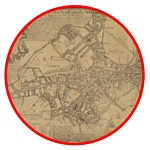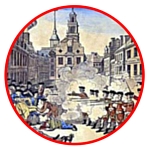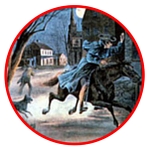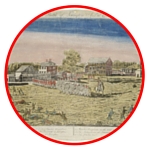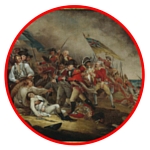VOCABULARY
|
Advantageous: Helpful or favorable. Battle: A fight between large, organized military forces. Battery: A group of cannons used by the military. Bayonet: A blade attached to the end of a musket. Blockade: To use warships to prevent other ships from entering or leaving a Cannonade: An attack with cannons. Cape: a point of land that juts out into a large body of water. Channel: A passageway in a harbor. Cashiered: Dismissed from the armed forces in disgrace because of a serious misdemeanor. Colonist: A settler in or inhabitant of a colony. Congress: A group of representatives who meet to work ourt a problem Deposition: A witness's formal statement, written or spoken, provided as evidence in support of facts.
Evacuation: 1.Something evacuated or discharged. 2.The withdrawal or removal of troops, civilians, etc. Fusil: A light flintlock musket. Fusilier: A member of any of several British regiments formerly armed with fusils. Garrison: A military force that is set to defend a fort or city Geography: The Study of Earth and the people, plants, and animals living on it. Harbor: A protected water area near shore ships where the water is deep enough for large ship can safely dock Intrenchments: Trenches, or narrow holes in the ground use to protect soldiers. Massacre: The killing of people who cannot defend themselves. Militia: A group of volunteer soldiers. Minutemen: A member of the Massachusetts colony militia who could quickly (in a few minutes) be ready to fight the British. Muster: A gathering of the militia to practice shooting or be inspected. Peninsula: A piece of land surrounded on three side by water Propaganda: Information, ideas or facts spread deliberately to further one's cause or to damage an opposing cause. Protest: To complain against an idea or an action. Provincial: An inhabitant of the regions outside the capital city of a country, especially when regarded as unsophisticated or narrow-minded. Redoubt: A small building or area that gives protection to soldiers under attack. Rubbish: Worthless, destroyed. Regulars: A name that referred to British soldiers during the Revolutionary War. Revolution: When people fight to replace one government with a different government. Shipwright: a person in the trade of yacht and/or shipbuilding. Shoreline: The water's edge. Surveyor: Someone whose job is to measure and examine an area of land. Siege: A long-lasting attack. Trench: A long narrow area dug in the ground, where the earth from which is thrown up in front to serve as a shelter from enemy fire or attack.
Topography: Arrangement of the land surface; the graphic description of that arrangement in map form, as by contour lines. Volley: When a large number of muskets is fired at once. Wharf: A structure built on the shore projecting out into a harbor or area of water so that ships can can dock, to load or unload. |
